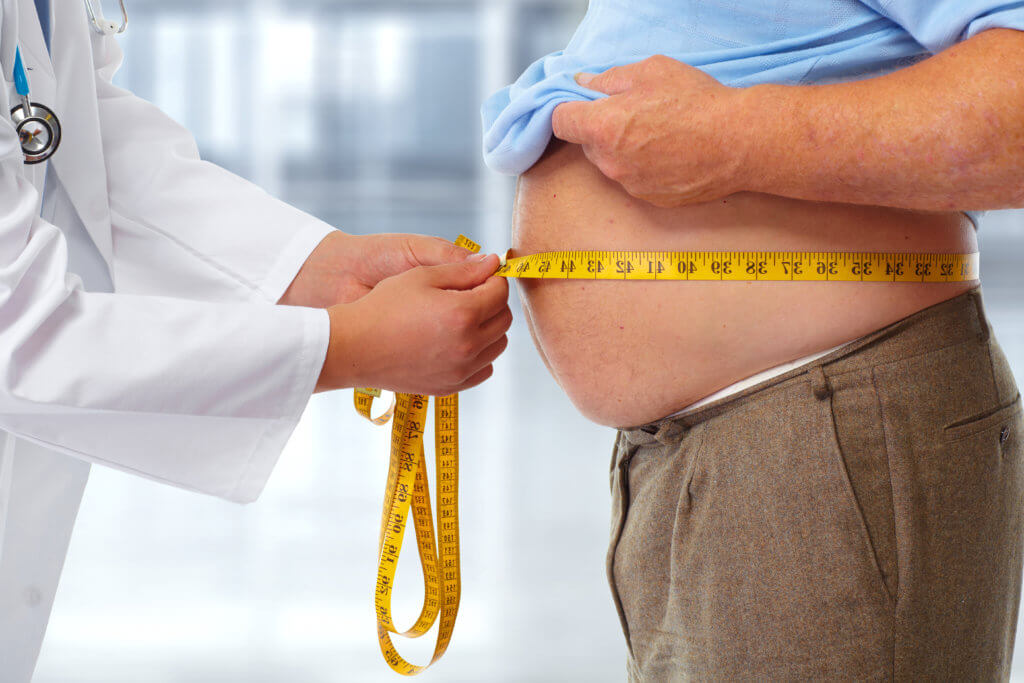BOULDER, Colo. — Although carrying too much weight can increase the risk of high blood pressure and heart disease, few studies actually say simply being a little overweight can lead to premature death. However, a new study is changing everything, finding that obesity significantly increases a person’s risk of death. A researcher from CU Boulder warns that obesity raises a person’s risk of death by anywhere from 22 to a staggering 91 percent.
Moreover, the new analysis of nearly 18,000 people finds scientists may be looking at body mass index (BMI) all wrong. The study author says this go-to measure of weight and fitness can lead to scientific bias and can actually provide a misleading picture of someone’s health. In the new study, the researcher found that one in six U.S. deaths have a connection to excess weight or obesity.
“Existing studies have likely underestimated the mortality consequences of living in a country where cheap, unhealthy food has grown increasingly accessible, and sedentary lifestyles have become the norm,” says study author Ryan Masters, an associate professor of sociology at CU Boulder, in a university release.
“This study and others are beginning to expose the true toll of this public health crisis.”
BMI thinks Tom Cruise is obese!
Masters notes that there is currently an “obesity paradox” when it comes to studying weight and longevity. This U-shaped curve shows that those in the “overweight” category (BMI 25–30) have the lowest risk of death. Meanwhile, previous studies say those in the “obese” category (BMI 30–35) have little to no increased risk of death in comparison to people in the “healthy” category (18.5–25).
“The conventional wisdom is that elevated BMI generally does not raise mortality risk until you get to very high levels, and that there are actually some survival benefits to being overweight,” Masters explains. “I have been suspicious of these claims.”
BMI is a measurement which comes from comparing weight and height only. It doesn’t account for various body type differences that people have, such as a shorter man or woman who is extremely fit and muscular and therefore weighs more.
“It’s a reflection of stature at a point in time. That’s it,” Masters says, citing actor Tom Cruise as an example.
At one point, the action star was an extremely muscular 201 pounds, despite only standing 5 feet, 7 inches tall. According to BMI, that puts the “Top Gun: Maverick” star in the “obese” category.
“It isn’t fully capturing all of the nuances and different sizes and shapes the body comes in,” Masters continues.

How long you’re obese matters the most
In this new study of weight’s link to health, Masters examined data from the National Health and Nutrition Examination Survey (NHANES) from 1988 to 2015. This study included information on 17,784 people, 4,468 who died.
One in five in the “healthy” weight category had been overweight or obese at some point over the past decade. Results show that these individuals in particular had a much worse health profile than other participants whose weight remained stable throughout the study.
Interestingly, results also show that carrying excess weight for a lifetime makes someone more likely to develop diseases which cause rapid weight loss. Therefore, if scientists look at BMI data during this time, Masters says it can skew scientific studies.
“I would argue that we have been artificially inflating the mortality risk in the low-BMI category by including those who had been high BMI and had just lost weight recently,” the researcher says.
Additionally, 37 percent of overweight participants and 60 percent of obese individuals had lower BMIs in the decade prior. Those who recently gained weight still had better overall health profiles. Masters says this shows that lifelong obesity is much worse for health than a sudden spike due to overeating. By including people who had a lifetime of low-BMI weight in the high-BMI category, previous studies have been incorrectly making obesity look safer that it really is, Masters explains.
“The health and mortality consequences of high BMI are not like a light switch. There’s an expanding body of work suggesting that the consequences are duration-dependent.”

Mortality risk has a straight-line link to weight
Instead of a U-shaped curve, the study finds a straight upward line linking BMI to a person’s risk of death. Unlike previous studies, the new report finds no risk increase among people in the “underweight” category. While prior studies estimate that two to three percent of U.S. adults die due to high BMI-related causes, this report says the number is actually eight times higher.
“For groups born in the 1970s or 1980s who have lived their whole lives in this obesogenic environment, the prospects of healthy aging into older adulthood does not look good right now,” Masters concludes. “I hope this work can influence higher-level discussions about what we as a society can do about it.”
The study is published in the journal Population Studies.


I though death was 100%
This is common knowledge. We really don’t need a “study” to tell us what is true or not, especially since science has completely turned into, primarily, a political device.
An interesting article and a reason to lose weight and not consider yourself beautiful when your fat.
Tell lizzo and her sycophants.
My mother was obese all of her adult life. She lived to 78. My great-grandmother was obese and lived to her 90s. My former mother-in-law weighed less than 100 and died at 39. Obesity is not the link. It’s high blood pressure.
tom cruise was never a “fit” 200+ pounds @ 5’7”
What a load of crap about Tom Cruise, muscle weighs heavier than fat & this article is garbage.
If fat is not healthy than being too lean is just as bad as fat insulates the body as well as other factors. Society shames people no matter how healthy looking or not. Give it a rest researchers your study will not change peoples minds.
Ugh, so I am not a health weight 51 yr old but was heavier most of my adult life. Sounds like I am a goner too soon.
My first reaction was “why would I believe this?. Maybe this is where we’re at now with science having become nothing but politics.. political groups, who at the moment, control research grant funding, want everyone to stop eating to “save the planet”. It could be just more fake BS like covid jabs, thalidimide, and fraudulent tobacco research. There is just a slew of garbage in research.aimed to support political interest groups and this might be one. I’m a former medical research writer and am familiar with it all. The timing looks a little suspect.
I think the risk of death is 100 percent for everyone, last I checked.
Touché
They need to remember that for many of us it’s impossible to get back to a “healthy” weight.
Interesting read, but one study, of limited size, does not categorically overturn years of research to the contrary. Just as this study points out there are anomalies in the previous research, there are likewise quite possibly anomalies with this research as well.
This study is as valuable as a study of children making mud pies.
I suggest they study insulin levels and insulin resistance.
Indeed
We’re born to die, some things just get you there faster it appears. I don’t buy the obesity story as stated, though we are what we eat rings valid.
We have a medical system that can harm people, iatrogenesis happens all the time. We have foods that can be harmful if eaten outside the moderate serving portions, we have water systems that can cause us illness, we’re surrounded by potential risks every day. I’d say it is more healthy to just live life, reject all the micro managing attempts when it comes to our health, and make an effort to take charge of your health outside of everyone that tells us what we should be scared of.
Take a walk, make an effort to live without so much “tech”, learn to converse again, face to face with people, get outside, away from computers and phones, that would be great for everyone’s health and it is simple.
Make sure you get proper balanced nutrition, supplement where necessary because it is no secret today’s food is lacking much when it comes to basic nutrition and over processing.
Eating real food is a great step to take, in fact if you can, grow as much of your own fruits and veggies you can, if you have the space to do so, you’ll never go hungry.
Obesity is no more an “increase risk of death” than waking up in the morning. Risk is everywhere and this study falls short of making its case, it is just more noise, when there is contrary data to suggest people with added weight actually live longer than very thin folks.
We really need to try and think for ourselves, or else someone will do that for us and market something to us that might not be a wise choice, such as the late 70’s and into the late 90’s of the “low fat no fat” diets that actually is proven now to have made countless people sick, because we actually need fat.
it set the stage for the statin con, even though many modern medical journals have stated for years, cholesterol was never a health risk, calcification of arteries was. We are easily fooled if do no make effort to learn nutrition and how to take better care of ourselves, we will believe anyone who is convincing, yet that doesn’t make their claims “true”. Profit over patient is alive and well, the data is available that proves this. We must learn to take charge of our own health.
We need to treat all these types of “studies” with skepticism since they are usually paid for by Big Pharma or govt sponsored Big Pharma. It wouldn’t surprise me if we see a bevvy of new weight loss drugs hit the market soon….lots of money to be made.
One can tell a lot more than BMI by pinching waist fat.
Wait. Isn’t this what the looney left calls body shaming while the conservatives call it unhealthy?
BMI is misleading. I am considered well overweight by BMI. The eyeball test and lifestyle are much better tests.